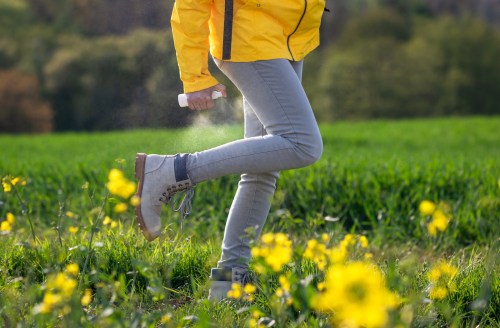You might’ve heard about the lone star tick, which can carry the Heartland virus, a rare and potentially deadly tick-borne disease. The virus doesn’t produce a distinctive symptom; however, it’s characterized by fever, fatigue, diarrhea, nausea, headache, decreased appetite, and joint or muscle pain. It’s usually severe enough to seek medical attention. The lone star tick has surfaced in at least six states, so—with everything you’ve heard—you may be wondering whether you should worry.
Experts in This Article
infectious disease specialist and professor of preventive medicine and health policy at the Vanderbilt University School of Medicine
The short answer: Unless you’re spending time in wooded areas unprotected, you don’t need to be overwhelmingly concerned with this specific tick, says William Schaffner, MD, professor of infectious diseases at the Vanderbilt University Medical Center. And, if you are spending time outdoors, you can do things to protect yourself from any ticks you might encounter (including the lone star tick).
For the uninitiated, ticks are not insects but tiny parasites from the spider family with eight legs, and they can be black, brown, or red. They need blood to complete their life cycle, and they may bite humans or animals, but they don’t all transmit diseases, Dr. Schaffner says. They can stay attached to the skin for several days or bite without attaching to your body.
There are several tick-borne diseases (think: Lyme disease and Rocky Mountain spotted fever), and they flourish during active tick season, which runs from spring through fall, Dr. Schaffner says, adding that germs like the Heartland virus have their own ecology, so it’s natural that they’d be in certain areas and not others.
We’re noticing the Heartland virus more because we’ve been on the lookout since its discovery in Missouri in 2009, Dr. Schaffner says. However, other tick-borne diseases, like Lyme Disease, are more common. The Centers for Disease Control and Prevention (CDC) estimates that over 476,000 people may get Lyme Disease each year (with about 30,000 cases reported to the CDC annually). There were over 50 reported cases of the Heartland virus as of January 2021.
“There are many different types of tick bites out there, and very few result in subsequent illness. We’re looking harder because now we have the scientific capacity to do it,” Dr. Schaffner says. “It’s important to let doctors know that Heartland is in their general area, so they have it in mind if someone has a virus-like illness and was outdoors without insect repellent.”
How to protect yourself from a tick-borne disease
Dr. Schaffner says, instead of worrying about a particular virus or focusing on a specific tick, your best bet is to use these precautions:
1. Don’t be surprised to find ticks year-round—as long as the temperature is above freezing. Ticks like tall grass and weeds, brush, shaded and wooded areas, gardens, decomposing leaves and wood piles. So, be sure to wear long sleeves and pants tucked into your socks so the pests can’t shimmy under your flared bottoms. And remember that no body part is off-limits: Ticks can hide in your hair, belly button and privates.
2. Dr. Schaffner says that if you’re heading out for a hike or to a woodsy area, douse yourself with a good insect repellent that contains active ingredients DEET or picaridin. Apply it to your clothes and exposed skin (like the back of your neck and ankles). The CDC recommends treating your clothes and gear with 0.5 percent permethrin and spraying your exposed skin with EPA-registered insect repellents that contain DEET, picaridin, IR3535, Oil of Lemon Eucalyptus (OLE), para-menthane-diol (PMD), or 2-undecanone.
3. It’s also crucial to inspect your body for ticks after you come in (or ask someone to do it for you). Be sure to self-check your hairline, back, waist, underarms, groin, and inner thighs. You need to do thorough checks of these areas even if you wore protective garments. “The tick can get under your clothing, crawl on your skin, bite you and get a blood meal,” Dr. Schaffner says. Shower after you come in and toss your clothes in the washing machine using hot water.
How to remove ticks
Forget folklore, says Dr. Schaffner. That means no lit matches, oils, nail polish or petroleum jelly. You want to remove the tick as soon as possible rather than wait for it to detach, and don’t swat or torch the tick.
1. Don’t use your bare hands. Instead, the CDC recommends you use clean, fine-tipped tweezers to grasp the tick firmly as close to your skin as you can. However, Dr. Schaffner says using tweezers isn’t ideal because you can pinch the tick and snap the body off, leaving the head in your skin. Instead, he suggests using a tissue to grasp the tick firmly as close to your skin as possible.
2. Gently and steadily pull the tick out perpendicular to your skin. Do not jerk it out because you might leave the head of the tick embedded.
3. Don’t crush the tick. Discard it in the trash or toilet. If you put it in the trash, seal it in plastic or tape first. If the tick is alive, you can dip it in alcohol to kill it.
4. Clean your bite and hands. Use soap and water or rubbing alcohol.
What to do if you’re feeling sick
If you’re ill, tell your health provider that you were outdoors, so they know that a tick bite is a possibility. If a tick bite is the culprit, don’t assume antibiotics are the answer. “Antibiotics don’t do anything for Heartland,” Dr. Schaffner says. “For some other tick-related illnesses like Rocky Mountain spotted fever, we would prescribe antibiotics, but only if you have the illness.” Dr. Schaffner says antibiotics don’t work well in preventive treatment—they postpone the development of the illness rather than avoid it. “Plus, you don’t want to take antibiotics unnecessarily,” he says.
Now the good news: Warmer weather is here, but you don’t have to swear off outdoor living. Ticks don’t fly. (Really, they don’t.) They can’t jump either. “They wait for a deer, raccoon, or human to come by and brush up against that branch or leaf and then they’ll fall onto the animal, crawl around and get the blood they’re looking for. Just sitting on your porch, even if you’re near the woods, doesn’t put you at risk,” Dr. Schaffner says. So, sink into that lounge chair and take a deep breath. And, when in doubt, do periodic checks for tick bites.
Oh hi! You look like someone who loves free workouts, discounts for cutting-edge wellness brands, and exclusive Well+Good content. Sign up for Well+, our online community of wellness insiders, and unlock your rewards instantly.
Sign Up for Our Daily Newsletter
Get all the latest in wellness, trends, food, fitness, beauty, and more delivered right to your inbox.
Got it, you've been added to our email list.











